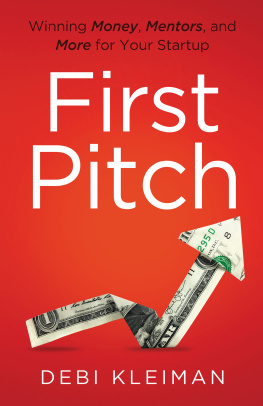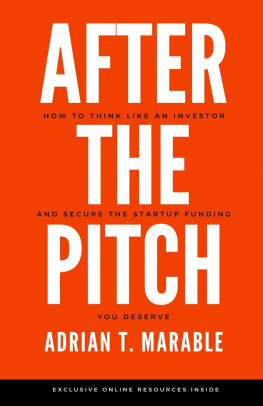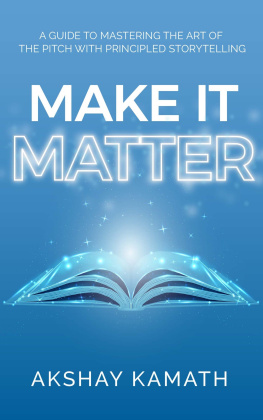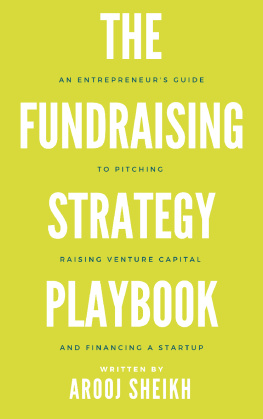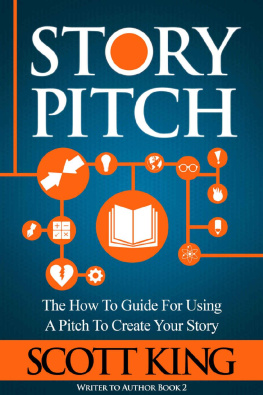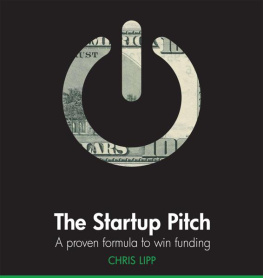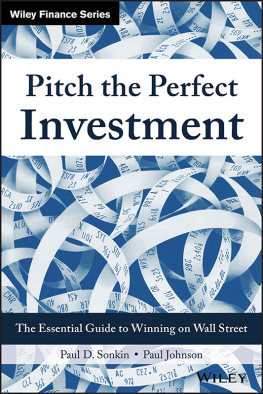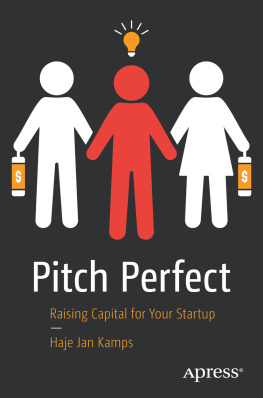All rights reserved.
For Brent, who gave the best pitch ever.
Introduction
As a first time entrepreneursomeone with a great business idea, a genius invention, or a brand new enterpriseyou have a lot of work to do if you are going to turn your startup dream into a real - life , thriving business.
After you find or create your business opportunity, youll need to understand your customers, learn if your product or service is feasible, figure out how to get your product or service to market, and then convince people to buy it. Thats a lot. And it can be daunting.
The good news is that there is one important skill, once you get it down, that can make all the work ahead of you so much easier to accomplish.
That essential skill is, of course, pitching.
Once you learn how to create and deliver a great pitch to hold up in any situation, you will be laying the foundation you will need to succeed in almost every aspect of your entrepreneurial journey. This is why it is so important to nail pitching from the start.
Your pitch is how you explain your idea to the world. It is the primary communication tool for your startup. You need a great pitch so you can attract mentors and contacts who open the right doors to know - how and money to bring your idea to life. And eventually, youll use your pitch to talk to potential customers, partners, and employees. It wont matter how good your idea is; if your pitch falls flat, you will be dismissed as an amateur.
Pitching is not only about presenting information on your sound business objectives; you also need to present yourself as an attractive future business partner. You must be able to show that you have a solid vision and the chops to bring it to fruition.
Investors and in - demand mentors see hundreds of pitches every year but only choose to work with a few. When they give their time and money to a startup entrepreneur, they do so because they feel a connection with the founder, his or her product, or more likely both. Their decisions are based on gut instinct as much as on reason. In fact, according to famed investor Howard Marks, investing decisions, including bad ones, are more likely to come from psychological factors than informational or analytical ones.
Your pitch must not only be perfect, its got to grab em in the gut.
Why Do You Need This Book?
Early - stage startups, which are at the very beginning of their journey, operate with a lot of risk and unproven assumptions. This can leave you, as an early - stage startup founder, feeling at a disadvantage. The guidance I provide in this book will help mitigate that feeling by offering communication tools and strategies that will serve you not only in creating and delivering a great pitch, but in all your professional interactions as well.
I am always coming across how - to blogs and videos with all kinds of advice on how to give a great pitch. There is so much information that it leaves many entrepreneurs feeling overwhelmed. While much of this content can be useful, it is in disparate places and being dished out in miniature bites, which makes it extremely difficult to translate into action. If you are having trouble figuring out where to start, how to take advantage of all the advice thrown your way, and if you are struggling with what to expect in the process, you are not alone.
After talking to hundreds of early - stage entrepreneurs and conducting my own search for materials to offer my students, I became convinced that something very important was missing: a single, easy - to - follow resource that helps entrepreneurs improve their startup communication skills. This book is intended to be that resource.
To be perfectly clear, this book is not going to teach you how to be in business. You wont learn how to compile your financials or read a term sheet. It is not going to lay out the elements you need to include in your negotiations with a potential investor. And, perhaps most importantly, this book is not a magic bullet that will propel you to success if you dont have a great business idea in the first place. A great pitch will not make a bad business idea good.
This book does give you the tools and actionable steps you need to pitch your startup like a pro. It will improve your communication skills and help you speak clearly and persuasively about your new venture. And its a one - stop resource for best practices in how to make a pitch, as well as all the vital dos and donts. To get you started, it provides an easy - to - implement framework that will help you create and deliver a compelling pitch to attract mentors, connections, and money.
Why Listen to Me?
Before I began teaching and working with entrepreneurs at Babson College, I earned degrees from Cornell University and Harvard Business School, which gave me a strong foundation of skills to run a business. Early in my career, I helped blue - chip consumer packaged goods companies launch new products. A decade of working at Coca - Cola , Procter & Gamble, and Welchs gave me a real - world education in classical marketing. I became an expert in brand building, product positioning, innovation, consumer insights, and how to create a winning marketing plan. My marketers perspective has helped me solve problems and improve results in all kinds of situations throughout my career in business, so it only makes sense that I would rely on the same marketing skills and concepts to inform my approach to pitching. But more on that later.
After ten years as a brand marketer, I joined the founding team of a tech startup as head of marketing. I successfully leveraged my marketing prowess to generate buzz. We raised enough money to stage a launch, but went down in a giant ball of it - just - wasn t - meant - to - be flames. It was a great learning experience and one that gives me empathy for the trials and tribulations of other startups.
Like so many entrepreneurs before me, I dusted myself off and tried again, joining Communispace, the Boston - based consumer insight and customer - driven innovation company, during its early days. For the next five years, I ran marketing, analyst relations, and sales operations until Omnicom DAS acquired the company in a nine - figure deal.
I went from working in a startup to working with startups as president of the Massachusetts Innovation and Technology Exchange (MITX), an association of digital marketers and technologists devoted to Boston - based digital innovation. My Board of Directors and the members of MITX were among the top serial entrepreneurs and venture capitalists in Boston. It was there, after noticing a huge gap in the marketing knowledgebase of most early - stage startups, that I created, along with two co - founders , a mentoring program for entrepreneurs to connect marketing experts with Boston - based startups. Through this highly successful mentoring program, I worked with entrepreneurs in top - tier accelerator programs like MassChallenge, TechStars, and the Harvard iLab, and immersed myself in the Boston startup community.

